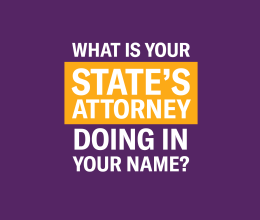
Vermont's elected prosecutors are called state's attorneys and you need to know who they are. They are the most powerful player in Vermont’s criminal legal system. They decide whether to bring criminal charges, what sentence lengths to recommend, what kinds of plea deals to offer, whether to recommend jailing a person while their case is pending, and more. Given state’s attorneys immense power and outsized impact on the lives of Vermonters, constituents must know what state’s attorneys are doing in their names. A functioning democracy requires no less.
Unfortunately, much of what state’s attorneys do is hidden from the public, many do not publish the most basic information about their practices, and none produce data about their work. That’s why the ACLU of Vermont has created profile pages for each state’s attorney showing their contact information, their office’s written policies (if they exist), and where you can find more information about them. For the first time, there will be one place to learn about Vermont’s state’s attorneys and whether Vermonters’ values are being honored by these elected officials.
Who is your state's attorney? What are they doing in your name? Learn more about them:
- Addison County: Dennis Wygmans
- Bennington County: Erica Marthage
- Caledonia County: Jessica Zaleski
- Chittenden County: Sarah George
- Essex County: Vincent Illuzzi
- Franklin County: James Hughes
- Grand Isle County: Douglas DiSabito
- Lamoille County: Todd Shove
- Orange County: Dickson Corbett
- Orleans County: Jennifer Barrett
- Rutland County: Rosemary Kennedy
- Washington County: Rory Thibault
- Windham County: Tracy Kelly Shriver
- Windsor County: Ward Goodenough
How do your state's attorney's policies compare to others in Vermont?
